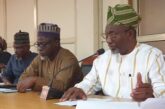
The Federal Government, through the National Universities Commission, has begun processes to introduce Tiv and Nupe languages as academic programmes in Nigerian universities, The PUNCH has learnt.
The NUC has also constituted a team of experts from Nigerian universities to develop the Core Curriculum Minimum Academic Standards for the new programmes.
According to minutes of a meeting obtained by our correspondent, the experts engaged as lead consultants are Professors Mary Adebayo and Rebecaa K. D. for the Tiv and Nupe programmes, respectively.
The minutes detailed the meeting between the expert panels and the Executive Secretary of the NUC, Prof Abdullahi Ribadu.
It stated, “The Executive Secretary of the Commission, Prof Abdullahi Ribadu, approved the engagement of experts from Nigerian universities to develop a Core Curriculum Minimum Academic Standards component for B.A. Tiv and B.A. Nupe, as the newest Nigerian Linguistic academic programme in the universities.”
It added, “The Tiv panel has Professors Muhammad Alkali and Musa Bawa, while the NUC representatives are Florence Onuoha and Chinenye Augustine.
“The Nupe panel also has Professors John Akosu Adeiyongo and Nguton Sambe, while the Commission’s representatives are Kate Omotayo Onaiyekan and Hadiza Kalla.”
The PUNCH reports that the development comes amid the Federal Government’s recent reversal of the 2022 National Language Policy.
The Minister of Education, Dr Tunji Alausa, had announced that English would now serve as the sole language of instruction in Nigerian schools from the primary to tertiary levels.
Alausa made the announcement at the 2025 Language in Education International Conference organised by the British Council in Abuja, arguing that teaching children in their mother tongues had contributed to poor performance in public examinations.
According to him, 15 years of data analysis showed that the mother-tongue-based model had not significantly improved learning outcomes.
The minister said the decision was grounded in evidence-based governance, aimed at enhancing global competitiveness and expanding access to knowledge and technology.
The announcement has since sparked debate among education stakeholders.
While some experts argue that the reversal was hasty, insisting that improved teacher training, investment in textbooks, and adequate learning materials were necessary to make the policy effective, others have welcomed the move, citing the importance of English proficiency in a globalised economy.




